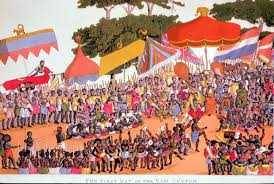THE HISTORY OF ASHANTI KINGDOM The **Ashanti Kingdom** is one of the most powerful and enduring states in West African history. Founded in the late 17th century, it rose to prominence in what is now modern-day Ghana. The kingdom played a significant role in the region's political, economic, and cultural development, and its influence continues to be felt in Ghana today.
Formation of the Ashanti Kingdom
The origins of the Ashanti Kingdom can be traced back to a group of Akan-speaking people who lived in the forest regions of what is now central Ghana. By the 16th century, several small Akan states existed in the region, but it was in the late 1600s that the Ashanti people, under the leadership of **Osei Tutu**, began to consolidate power.
Osei Tutu, with the assistance of his priest and adviser **Okomfo Anokye**, is credited with unifying the Ashanti clans into a centralized kingdom. This unification was symbolized by the creation of the **Golden Stool**, which is said to house the soul of the Ashanti nation and remains one of the most sacred objects in Ashanti culture. Osei Tutu became the first **Asantehene** (king) and under his leadership, the Ashanti Kingdom expanded its influence, controlling neighboring states and establishing itself as a dominant force in the region.
Expansion and Political Organization
The Ashanti Kingdom was able to expand rapidly due to its highly organized military structure, which was one of the most efficient in West Africa. The Ashanti army, armed with European firearms acquired through trade, was able to subdue neighboring states and absorb them into the growing empire. This expansion allowed the Ashanti to dominate the gold trade, which was a major source of wealth for the kingdom. Gold from Ashanti mines flowed through European traders, who established trading posts along the coast.
The political organization of the Ashanti Kingdom was centered around a strong, centralized authority, but it also maintained a system of checks and balances through a **confederacy** of chiefs. While the Asantehene held ultimate power, local chiefs retained a degree of autonomy over their territories, and they participated in decision-making at the national level through a council of elders.
The Ashanti state was also unique in its use of the Golden Stool as both a religious and political symbol. It was believed that the Stool embodied the spirit of the Ashanti people, and the king’s power was linked to his role as the custodian of the Stool. No one, not even the king, could sit on it. This concept of governance was deeply rooted in Ashanti religious and cultural beliefs, ensuring the kingdom's stability and unity.
Relations with Europeans
From the late 17th century onward, the Ashanti engaged in complex relations with European powers, particularly the British, Dutch, and Portuguese. The kingdom initially prospered through trade with Europeans, exchanging gold, slaves, and other goods for firearms and manufactured goods.
However, as European colonization efforts in Africa intensified in the 19th century, tensions between the Ashanti and the British escalated. The Ashanti fought several wars with the British, known as the **Anglo-Ashanti Wars**. The most significant of these conflicts was the **War of the Golden Stool** in 1900, which was triggered by a British demand for the Golden Stool, symbolizing Ashanti sovereignty. The Ashanti fiercely resisted this demand, and although they were eventually defeated, they maintained their cultural and political identity.
Decline and Legacy
The Ashanti Kingdom’s decline began in the late 19th century as a result of repeated conflicts with the British. In 1896, after a series of wars, the British finally overpowered the Ashanti forces and exiled the Asantehene, **Prempeh I**, to the Seychelles. Despite this, the Ashanti maintained a significant degree of autonomy, and the British recognized their traditional governance structures.
In 1901, the British formally annexed the Ashanti Kingdom as a protectorate, but it was not fully integrated into the British Gold Coast colony. The Ashanti culture, including their traditional festivals, social structures, and reverence for the Golden Stool, continued to thrive under colonial rule.
In 1935, the Ashanti Confederacy was restored under British colonial oversight, and in 1957, when Ghana gained independence from Britain, the Ashanti Kingdom became an integral part of the new nation.
Conclusion
The history of the Ashanti Kingdom is a testament to the resilience and strength of its people. From its formation under Osei Tutu to its role in resisting European colonization, the Ashanti Kingdom was one of the most influential African states. The legacy of the kingdom is still evident today in Ghana, where the Ashanti people continue to celebrate their rich cultural heritage, and the Asantehene remains an important figure in the country’s traditional leadership.




No comments yet
Be the first to share your thoughts!